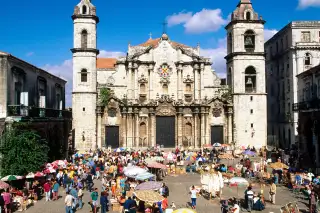Thinking About a Trip to Cuba? 5 Things You Should Know

Did you hear that noise yesterday afternoon? It was the collective squeal of travelers around the country, upon learning that President Obama had announced the resumption of U.S diplomatic relations with Cuba. For many American vacationers, Cuba—with its classic cars, mojitos, and fine cigars—is a dream destination, but one that rigid travel restrictions have made difficult to visit. Yesterday's announcement didn't remove those strictures, but it did promise to relax them.
Ready to go? Here's what you should know.
1. Don't expect anything to change overnight
While the new policy won't allow unrestricted tourism to Cuba (which would require an act of Congress), it will loosen restrictions on certain types of trips, according to a White House statement. So what exactly does that mean? There's plenty of speculation, but no one really knows the details just yet. On Wednesday afternoon, the Office of Foreign Assets Control (OFAC), part of the Department of the Treasury, announced that it expects to issue its revised travel rules in "the coming weeks." No changes will take effect until those new rules are released.
Currently, U.S. citizens who want to visit Cuba have a few options. Cuban-Americans with close family in the country can visit as often as they like, while other people may be permitted to go for professional, religious, or educational purposes. However, for the typical traveler, the most viable option is a "people-to-people" trip. These are super-regulated group tours, which must focus on educational and cultural interactions with Cubans. Many industry experts expect that the new rules will focus on loosening the restrictions around these existing forms of travel.
2. Some prices may fall...
According to Collin Laverty, president of trip provider Cuba Educational Travel, the typical cost of a group tour to Cuba is around $4,000 to $5,000. One reason prices are so steep, he explains, is that people-to-people trips must be highly scheduled, meaning they include all meals, guides, transportation, activities, and more. Plus, tour providers must stay on top of their permits and licensing, which requires manpower and lawyers' fees. (Katharine Bonner, who oversees travel to Cuba for Tauck, says it took six months for the company to get its paperwork renewed.) Tom Popper, president of operator insightCuba, adds that Cuban travel suppliers tend to charge American firms a premium, which drives up the price of the tour.
If the new rules allow less rigorously structured tours, prices are expected to come down. And, should they allow for independent travel to the country, vacationers will likely be able to choose their lodging and itinerary, giving them more control over what they pay.
3. ...but demand is likely to pick up quickly.
Travel to Cuba is already pretty popular. According to the Associated Press, 170,000 Americans visited the country legally last year, while Quartz reports that the island was the second most popular Caribbean destination for international travelers during the first nine months of 2014. As U.S. travel restrictions ease, trip providers say they expect demand to surge. For people who've always wanted to go but never managed to pull the trigger, the idea that massive cruise lines could soon be adding Cuba to their itineraries may be what it takes to get them to book. "People want to go before it changes," says Popper. "The collective travel consciousness says this isn’t going to last forever."
4. The infrastructure isn't there yet.
For Canadians and other international travelers, Cuba is often seen as a sun-and-sand getaway rather than a cultural destination, says Laverty. As a result, "there are a sufficient amount of hotels by the beaches, but once you get into Havana, there aren't enough rooms," he says. Until the country's tourism infrastructure has a chance to catch up, Americans looking to stay in the cities or countryside may have a tough time finding accommodations. Flights are also tricky. Right now, the only domestic commercial options are charters, all of which fly out of Florida.
5. New options are coming.
Under the current system, travel companies that are licensed to take Americans to Cuba have something of a monopoly, says Laverty. While the new rules are unlikely to completely erode that advantage, they should make the industry more competitive and fuel new options for travelers. In the case of Cuba Educational Travel, that may mean adding some more independent, less full-service options. Says Laverty: "We're ready to help people navigate these uncharted waters."
Read next: Viva Cuba Libre